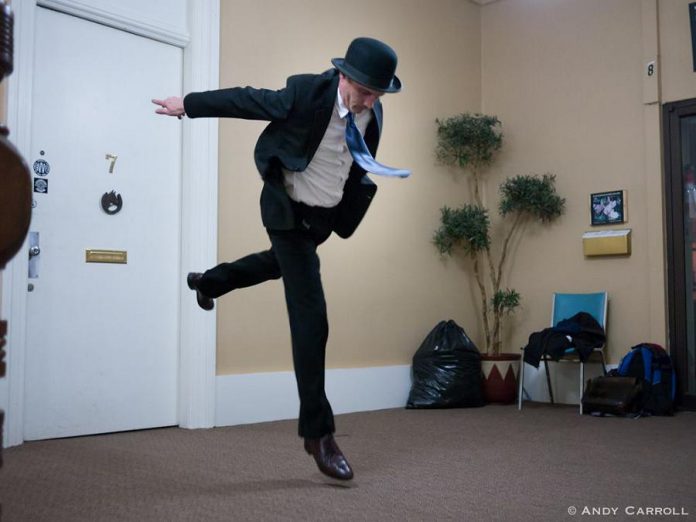
Precarity – a precarious existence, lacking in predictability, job security, material or psychological welfare. The social class defined by this condition has been termed the precariat.
Already in full swing, local arts organizations are participating in the Precarious Festival, a look at the delicate economic situation faced by local artists living and working in Peterborough.
Throughout the month of November and early December, the Precarious Festival brings together a number of local groups — including Fleshy Thud, Artspace, Trent Radio, Nourish Peterborough, The Nogojiwanong Friendship Centre, Trent Community Research Centre, Electric City Culture Council, Evans Contemporary, and Public Energy — as a way to open discussion between local artists of all disciplines through a number of events including art installations, panel discussions, dance performances, coffee houses, theatrical performances, public art displays, mentorships, and other events.
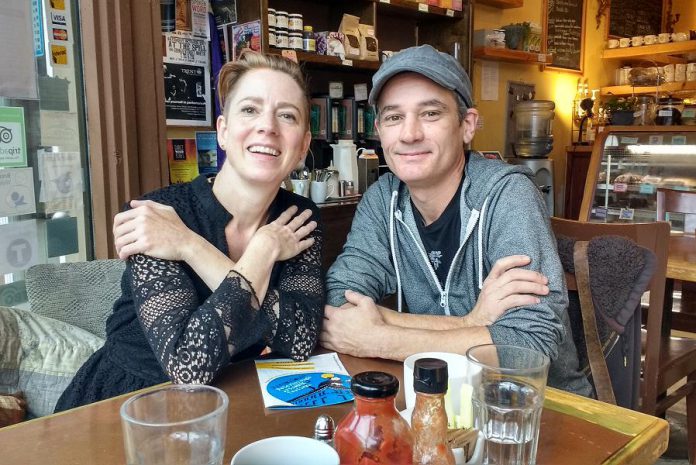
Building off of last year’s successful Bernie Martin Festival, the Precarious Festival is the brainchild of Kate Story and Ryan Kerr of The Theatre on King (TTOK). They came up with the idea after talking to local art workers while looking for a potential theme for the second city-wide festival.
“Basically we had the Bernie Martin Festival and we thought it went really well, so we wanted to do something like that again,” Kate says. “We went around talking to different artists to get a sense of what a theme might be, and the word that everybody seemed to be using was ‘precarious.’ That’s how people are feeling.”
Although many factors play into the theme of “precarious” within the festival, a large part of the focus is the fact that most working artists are not able to make a livable income from their art, and changes within our city are making this even more difficult.
“Peterborough is really at a crossroads,” says Kate. “For a long time Peterborough was an industrial town and the core got hollowed out. It didn’t work in terms of employment levels, but it meant that there was a lot of cheap rent in the downtown core. But now with the 407 extension and the move to gentrify the downtown, that could change things.
“There’s all these people that get excited about these one-roof projects, but I think that they should stop trying to organize us and put us in a ghetto. Just let us live and work where we want to live and work. All we need is financial support or rent that’s affordable. It’s hard to make a case for this for some reason, which is mysterious to me. Governments will put a huge amount of money into business. They’ll subsidize businesses, subsidize mining, and even subsidize banks.
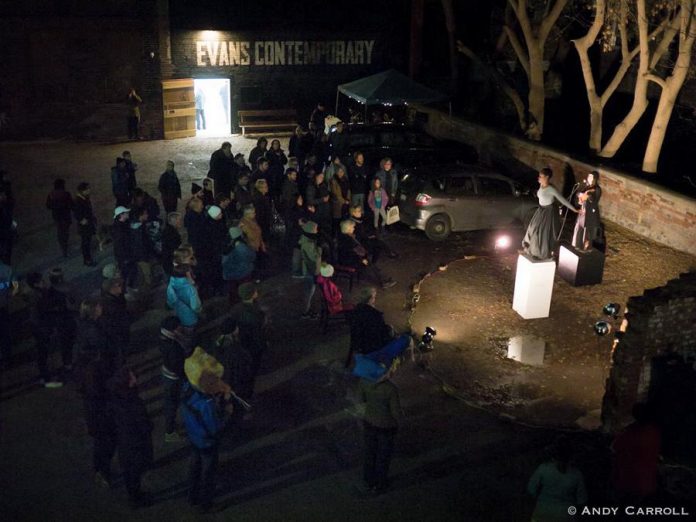
“But for some reason to give money to the arts, or even giving grants to artists, is like a hand out. You have to be so accountable for that money. I don’t have any problem with that. I just think that bankers should have to be just as accountable for that money as artists are. I have a lot of feelings about that.”
“A lot of people who show up to Peterborough know that there is a great arts scene,” adds Ryan. “It’s just that the arts scene isn’t supported.”
“We’re far enough away from Toronto that we don’t just go there, but we’re small enough so we’re excited when new artists come into town,” Kate says. “We’re large enough to create and interesting and varied scenes, and there is a lot of collaboration that happens here. But I think, again, with this looming gentrification we are looking at a precarious situation right now. I would love to see this city get more behind the support of the arts, and a more sophisticated understanding of the arts and economy.
“And I’m not just saying that the arts is important just because of economic impact. But that’s the language we have to use when talking to some of these people. Every study shows that part of having a healthy community is having a healthy arts scene. Yet somehow it seems difficult to sell this idea.”
At the centre of the Precarious Festival is an online survey created by the Electric City Culture Council, which is aiming to collect data about working artists living in Peterborough and the surrounding areas. The first of its kind, the survey can be taken at https://www.surveymonkey.com/r/XNHGHH8.
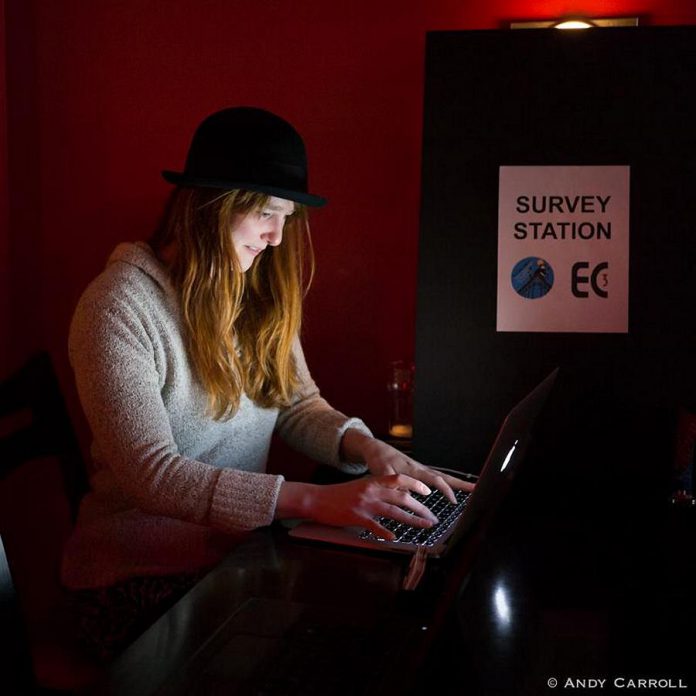
“There has never been a survey done of Peterborough artists,” Kate points out. “A lot of blood, sweat, and tears went into getting this thing up. A lot of the data is demographics to compare the makeup of our local population, but it’s also about economics as well. It’s about how much money that you make in a year, and how much money is in your arts practice, and how much money is spent on your art.
“This survey is a vital thing to have people to fill out, because the data will give us the information we need to make a case for support to the city, to the province, and to the federal government as well.”
While advocating for economic viability for local artists is an objective of the Precarious Festival — and there are several discussions and talks during the festival on this topic — it’s also about presenting art.
There are far too many individual events to cover here (see the Precarious Festival website at ttok.ca/precarious-festival/ for a listing of all the events), but I want to highlight three brand new locally created theatrical performances making their debut during the festival.
The first of these performances, titled Neighbours/Voisons, is presented by the Ring O’Rosie Collective at Artspace. Developed by Lillian Ross-Millard, Miranda Jones, and Anne White, Neighbours/Voisons is inspired by Norman McLaren’s 1952 stop-motion animation film using live actors called Neighbours. Running at ten minutes in length, the performers will present the piece multiple times over the course of the evening.
“Neighbours/Voisons explores conflict, interiors, and the challenge of real bodies moving in stop motion,” explains Ring O’Rosie’s Miranda Jones. “It’s going to be a little bit chaotic, and we encourage people to stay and see the second performance because you’ll never catch everything otherwise. Its ten minutes long and runs on a loop every ten minutes.”
Neighbours/Voisons will be performed at Artspace in ten minute cycles from 6 to 8 p.m. on November 13th and 14th, and from 12 to 2 p.m. on November 15th. Admission is $10 or pay what you can.
On Sunday, November 26th, Eryn Lidster presents an original piece called Invisible at TTOK, which explores the backstage work often unseen by theatre audiences. Eryn is a familiar face in the theatre community and Invisible is her first directorial work. Working on a framework developed by Eryn, the piece has come together through the input and improvisation of her actors ( Lindsay Unterlander, Dan Smith, Samuelle Weatherdon, and Robyn Smith) during rehearsals.
“When I think about precarity, I think about the collaborative nature of the backstage work,” explains Eryn. “But getting all the people in the same room at the same time can be difficult because we are all so busy. We’re trying to support all these theatre projects, but that can be difficult from an economic standpoint — to support yourself and these projects.
“I’m trying to put in some of the funny stuff — like when you are working so hard that you often get sick — and I think some of those issues come into question, like whether or not this kind of working environment creates good art. But there is a flip side to it too, and that’s all of the beautiful things that happens as part of the backstage theatre that the audience doesn’t get to see. There’s some really amazing moments that only the cast and the people involved in it get to experience.”
Invisible will be performed at TTOK from November 26 to 28th at 8 pm. Admission is $15 or pay what you can.
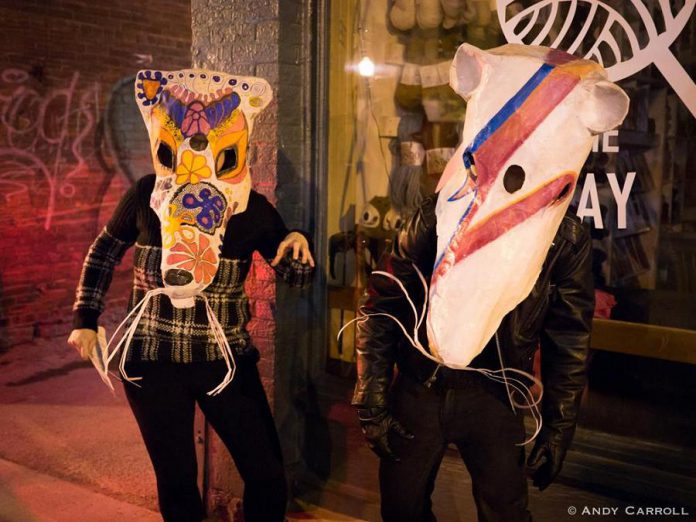
Finally, on Thursday, November 30th, The Nervous System presents a new show written by Kate Story called Festivus Rattus 2035. A post-apocalyptic retelling of the Pied Piper of Hamelin, Festivus Rattus 2035 features Brad Brackenridge, Sylvie Dasne, Naomi Duvall, Derek Bell, Rob Fortin, Ryan Kerr, Shannon McKenzie, Mike Moring, Susan Newman, and Robyn Smith.
“Fairy tales are always interesting because they can be used on so many levels as a narrative,” Kate says of her new show. “In all the versions I read of the Pied Piper, the promise of money to the piper that is then taken away is quite accurate. A specific number is always mentioned: fifty thousand florins, then a thousand florin, then five florins. So I find that the money is kind of the key.
“But then he takes the children, which is quite creepy. So I was wondering if the story is kind of a grizzly warning of what happens if the artist doesn’t get paid. On some psychological level, I feel our society is quite like that. If we think of children as a metaphor for our community, I do feel that by not supporting the arts we are robbing ourselves of our own sense of community.”
Festivus Rattus 2035 runs from November 30th to December 2nd at TTOK. Shows start at 8 p.m., with an additional 2 p.m. matinee on Saturday, November 2nd. Note that the show has strong themes and is not recommended for young audiences.
Throught the theatrical presentations, art installations, panels, talks and other events during the Precarious Festival, Ryan and Kate hope that a solid discourse about the fragile economical state of our artistic community can be created by both artists and the greater community.
“A lot of artists, such as visual artists, might not see anybody for a week or two,” Ryan says. “Working in isolation make you feel that nobody understands and nobody gets you. But at the same time, having a discussion where you realize you’re not the only one having these problems, and that you are not alone, is very empowering, and makes you take a different look at your work.
“If you’re working all depressed, it’s probably going to show in your work. But if you know that you’re not alone, then you know there is hope.”
The Precarious Festival runs until December 2nd with events happening throughout the downtown core. For a full calendar of events, visit the Precarious Festival website at ttok.ca/precarious-festival/.


























